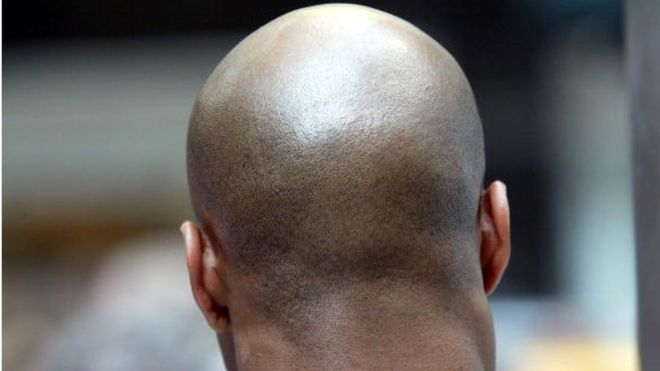Pollution could be making your bald by decreasing levels of crucial proteins for hair growth, scientists fear.
For the first time, researchers have shown tiny toxic particles can damage chemical processes within cells that promote hair growth.
This ‘could lead to baldness’, the scientists claim. However, further trials are needed because their studies were on human cells in the lab.
Academics behind the research have now suggested people should spend less time exercising outdoors, if they want to avoid hair loss.
The work focused on common air pollutants known as particulate matter (PM), which are emitted by car exhausts, industry and household heating.
PM is at the center of a public health storm, having been linked to serious problems including asthma, heart and lung disease.
But evidence of its effects on skin is still in its infancy – despite a growing market for anti-pollution cosmetics.
The research was conducted by The Future Science Research Center in the Republic of Korea, led by Hyuk Chul Kwon.
The team harvested cells from the human scalp at the base of hair follicles, known as dermal papilla cells (DPs).
DPs sit at the base of a hair follicle, underneath the scalp, and work alongside skin surface cells to control the formation of the hair shaft.
These cells are responsible for hair growth and hair retention and need proteins to to function.
The DPs were exposed to various concentrations of PM10, which are particles with a diameter of ten micrometres or smaller, including diesel and dust.
After 24 hours the researchers detected the levels of specific proteins in the cells using a scientific process known as western blotting.
The test can identify which proteins are present and in what quantities, depending on how they bind to specific antibodies.
Results showed the levels of beta-catenin had dropped, a protein which is responsible for triggering hair growth.
The study also revealed that the levels of three other proteins – cyclin D1, cyclin E and CDK2 – were decreased by PM10, which would affect both hair growth and retention.
Dr Hyuk Chul Kwon said: ‘Our research explains the mode of action of air pollutants on human follicle dermal papilla cells, showing how the most common air pollutants lead to hair loss.
‘The results suggest that particulate matter may causes hair loss.
‘It is therefore possible to hypothesis that at certain levels of exposure, this could lead to baldness. But further population-based research needs to be undertaken to confirm this.
‘While the link between air pollution and serious diseases such as cancer, COPD [chronic obstructive pulmonary disease] and CVD [cardiovascular disease] are well established there is little to no research on the effect of particular matter exposure on the human skin and hair in particular.’
He added: ‘While it is difficult to escape ambient pollution, limiting time walking on busy streets, especially during rush hour, should help to reduce exposure.
‘If you are exercising outdoors, try to do so in areas that are less polluted and do not spend too much time waiting at traffic hotspots such as traffic lights.’
PM is made up of a mixture of solid particles and droplets found in the air that are so small they can be inhaled.
PM2.5 are the smallest particles, with a diameter of 2.5 micrometers or smaller – finer than a human hair.
Both PM10 and PM2.5 are considered to be major pollutants, alongside nitrogen oxide, ammonia and sulphur dioxide.
Almost 40 per cent of PM emissions that originate in the UK come from burning wood and coal in domestic open fires and solid fuel stoves. Some 16 per cent is from industrial combustion.
PM has the ability to travel large distances. Therefore, what is emitted into the atmosphere in one country can end up in another.
Experts have warned even low levels of exposure to pollution is dangerous, suggesting current air quality guidelines don’t protect public health.
Outdoor air pollution is estimated to kill 4.2million people every year, according to The World Health Organization.
But the effects on the skin and hair are not as well established as disease burden.
The beauty industry is saturated with ‘anti-pollution’ products with claims of preventing premature ageing and lifeless hair.
But the manufactures are generally referring to free radicals when they mention ‘pollution’.
Free radicals are generated by smog, cigarette smoke and chemicals in the house. When there is an imbalance in the body, it can cause oxidative stress.
Oxidative stress has been linked to ageing and other diseases because damage takes place in DNA and proteins.
Dr Kapil Bhargava, a consultant dermatologist and British Skin Foundation spokesperson, said: ‘Pollutants seems to be exacerbating a number of skin conditions such as pigmentation or hair loss.
‘More and more evidence is emerging regarding pollution and the skin – pollutants will cause damage to skin cells by the formation of free radicals or other chemicals.
‘However pollution specific conditions are not yet clearly defined.
‘Products to combat the pollution related changes are being widely sold but there is little evidence that they work to prevent the damage from pollution to the skin.’
The research was presented today at the 28th European Academy of Dermatology and Venereology Congress in Madrid and has not been published yet.



